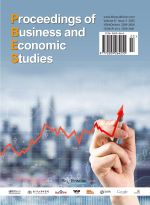Abstract
The livestock farming is an important pillar of the rural economy in China. To explore the impact of government technical subsidies and pollution penalties on the digital and intelligent transformation of livestock enterprises, an evolutionary game theoretical model between the government and livestock enterprises is constructed. The interaction mechanism of the game between the government and breeding enterprises is explored, and simulation is conducted. The research results show that the combined strategy of pollution penalties and technical subsidies is the optimal strategy for the government; the system is jointly driven by government subsidies, technical costs of transformation input, public willingness, and enterprise willingness.
References
Si L, Cao H, 2020, The Impact of Emission Trading Rights on Pollutant Emissions: A Quasi-Natural Experiment Analysis Based on the Difference-in-Differences Method. Management Review, 32(12): 15–26.
Jia W, Wang W, Jia R, 2018, Analysis of Key Variable Correlation Feedback Loops for the Development Countermeasures of Debang Large-Scale Breeding and Planting Systems. Chinese Journal of Management Science, 26(01): 186–196.
Lin M, 2022, Developing Large-Scale Deep-Sea Aquaculture: Problems, Models and Implementation Paths. Management World, 38(12): 39–60.
Nie J, Liu M, 2021, The Impact of Nonlinear Production Costs on Supply Chain Social Responsibility Sharing Strategies. Industrial Engineering and Management, 26(02): 57–65.
Liang X, Chen Q, 2023, Research on the Evolutionary Game of Major Epidemic Prevention and Control Under the Dynamic Reward and Punishment Mechanism of the Government. Chinese Journal of Management Science, 31(03): 277–286.
Yang X, He G, Wu C, Wang X, 2023, Evolutionary Game Analysis of Carbon Emission Reduction Between the Government and Heavy Polluting Enterprises Under the Carbon Trading Mechanism. Journal of Safety and Environment, 2023: 1–11.
Fang G, He Y, Tian L, 2023, Evolutionary Game Analysis of Government-Enterprise Carbon Emission Reduction Driven by Carbon Trading. Chinese Journal of Management Science, 2023: 1–12.
Zhu J, Zhu H, 2021, Can Government Subsidies Motivate Enterprise Innovation? – Analysis of Innovation Behaviors of Start-up and Incumbent Enterprises Based on Evolutionary Game. Chinese Journal of Management Science, 29(12): 53–67.
Cao Y, Li X, Hu H, et al., 2023, How Does Digitalization Promote the Green Transformation of Manufacturing Enterprises? – An Exploratory Case Study From the Perspective of Resource Orchestration Theory. J. Manag. World 39.03 (2023): 96–112.
Cheng Q, Ding H, 2022, Research on the Impact of Tax Preferences on the Digital Transformation of Resource-Based Enterprises. Chinese Journal of Management, 19(08): 1125–1133.
Wang A, Hu S, Li J, 2021, Does Economic Development Help Achieve the Goals of Environmental Regulation? Evidence From Partially Linear Functional-Coefficient Model. Energy Economics, 103: 105618.
Song Y, Zhang X, Zhang M, 2021, The Influence of Environmental Regulation on Industrial Structure Upgrading: Based on the Strategic Interaction Behavior of Environmental Regulation Among Local Governments. Technological Forecasting and Social Change, 170: 120930.
Zhuo C, Chen J, 2023, Can Digital Transformation Overcome the Enterprise Innovation Dilemma: Effect, Mechanism and Effective Boundary. Technological Forecasting and Social Change, 190: 122378.
Xu J, Yu Y, Zhang M, et al., 2023, Impacts of Digital Transformation on Eco-Innovation and Sustainable Performance: Evidence From Chinese Manufacturing Companies. Journal of Cleaner Production, 393: 136278.
Zhou X, Li C, Liu Y, et al., 2023, The Tripartite Collaborative Evolution Strategy of Industrial Internet Platforms, Developers and Enterprises: Also on the Role of Government Subsidies and Revenue Sharing. Chinese Journal of Management Science, 2023: 1–14.
